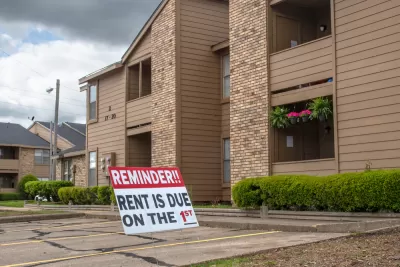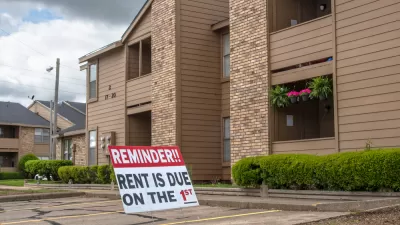More than a dozen states are using Community Development Block Grant funding from the CARES Act to fund emergency rental and mortgage assistance programs.

At least 15 states and the District of Columbia are using federally funded relief for renters. Colorado, Connecticut, Florida, Illinois, Iowa, Maryland, Massachusetts, Nevada, North Carolina, New Hampshire, New Jersey, Pennsylvania, Utah, Washington, Wyoming, and Washington, D.C., are using Community Development Block Grant funding from Congress’s March CARES Act to fund emergency rental and mortgage assistance programs.
Many of the programs are just getting underway, illustrating the challenge of quickly spinning up the gears of bureaucracy, especially amid a pandemic. But the crisis has forced some agencies to implement creative solutions that cut back on red tape and streamline processes for getting money out the door. The glaring inequitable impacts of COVID-19 have led some states to use new frameworks for disbursing funds. Though the programs are still in their infancy, their challenges and successes are already spurring conversations among advocates, community groups, and housing providers about how to use emergency rent relief after the pandemic.
The programs range widely from state to state. In some places, such as Massachusetts, the federal funds are expanding existing emergency rent relief programs. Many other states are building out entirely new programs. On the low end, Utah is using $3 million in CARES funding to seed its rent relief efforts. On the high end, Illinois and Pennsylvania are pumping $150 million of CARES funding into rent relief, with the latter state spending another $25 million in CARES funding on a separate mortgage relief effort. Even at the high end, officials see the programs as stopgap measures that will fall far short of helping every resident in need.
In Washington, the state legislature dedicated $100 million in CARES funding to create ...
FULL STORY: States Use CARES Act Funds to Keep Renters Afloat, But It Won’t Be Enough

Alabama: Trump Terminates Settlements for Black Communities Harmed By Raw Sewage
Trump deemed the landmark civil rights agreement “illegal DEI and environmental justice policy.”

Planetizen Federal Action Tracker
A weekly monitor of how Trump’s orders and actions are impacting planners and planning in America.

Why Should We Subsidize Public Transportation?
Many public transit agencies face financial stress due to rising costs, declining fare revenue, and declining subsidies. Transit advocates must provide a strong business case for increasing public transit funding.

Understanding Road Diets
An explainer from Momentum highlights the advantages of reducing vehicle lanes in favor of more bike, transit, and pedestrian infrastructure.

New California Law Regulates Warehouse Pollution
A new law tightens building and emissions regulations for large distribution warehouses to mitigate air pollution and traffic in surrounding communities.

Phoenix Announces Opening Date for Light Rail Extension
The South Central extension will connect South Phoenix to downtown and other major hubs starting on June 7.
Urban Design for Planners 1: Software Tools
This six-course series explores essential urban design concepts using open source software and equips planners with the tools they need to participate fully in the urban design process.
Planning for Universal Design
Learn the tools for implementing Universal Design in planning regulations.
Caltrans
Smith Gee Studio
Institute for Housing and Urban Development Studies (IHS)
City of Grandview
Harvard GSD Executive Education
Toledo-Lucas County Plan Commissions
Salt Lake City
NYU Wagner Graduate School of Public Service





























